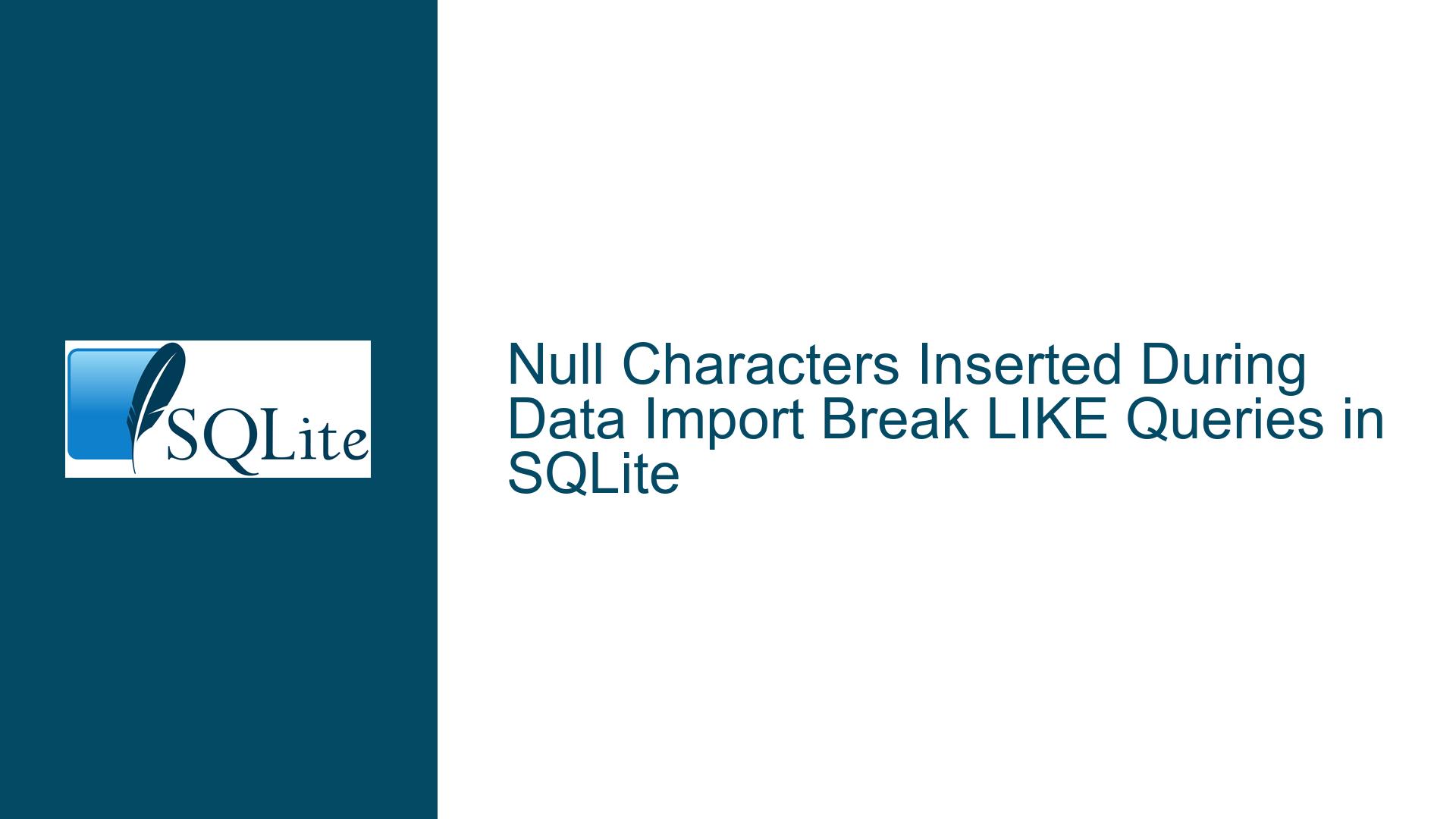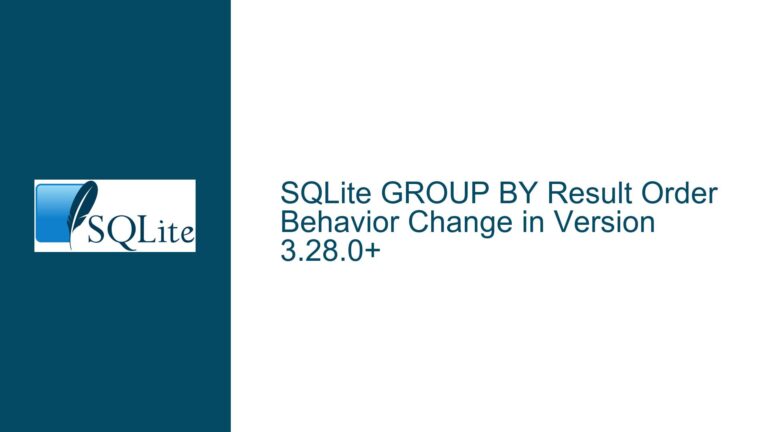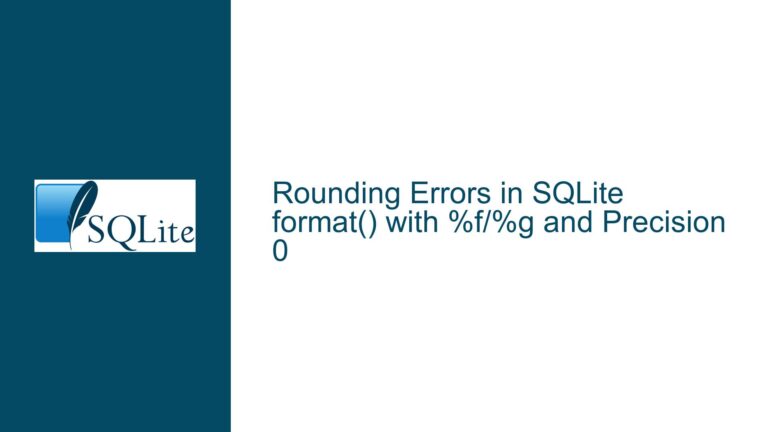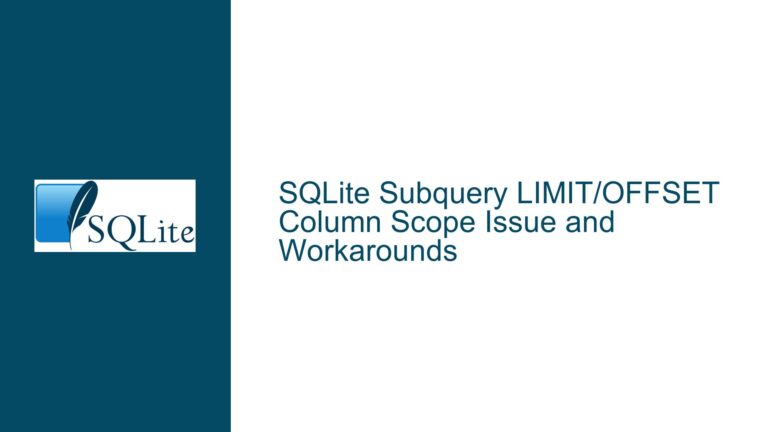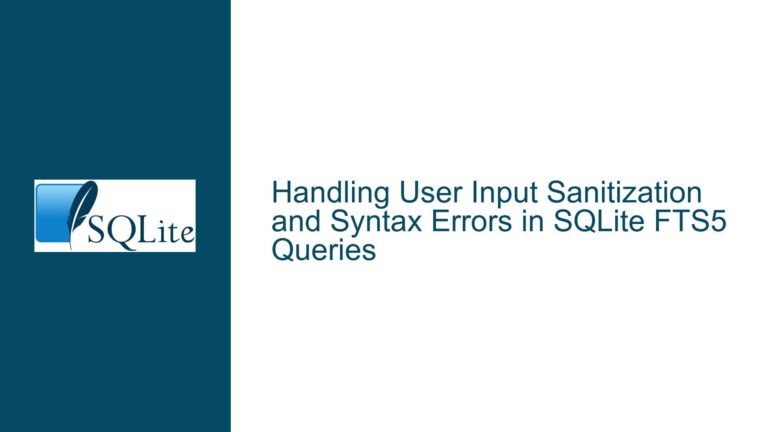Null Characters Inserted During Data Import Break LIKE Queries in SQLite
Data Corruption via Null Characters in Imported Strings
Null Characters Observed in Imported Data Causing LIKE Query Failures
The core issue involves the unintended presence of null characters (0x00 bytes) within string values imported into an SQLite database, which subsequently causes unexpected failures when using pattern matching with the LIKE operator. These null characters act as invisible string terminators that create mismatches between stored values and query literals. For example, a stored value like 'A\0B' (where \0 represents a null byte) will not match 'AB' in a LIKE query even though the visible characters appear identical. This problem frequently originates from character encoding mismatches during data import operations rather than explicit insertion of null bytes by users. The conflict arises between how source data is encoded (particularly with multi-byte encodings like UTF-16) versus SQLite’s default UTF-8 handling, compounded by the database engine’s strict byte-level comparison logic.
UTF-16 Encoding Mismatch and Binary Data Handling
The primary cause stems from importing UTF-16 encoded text without proper conversion to SQLite’s native UTF-8 encoding. UTF-16 represents characters using 2 or 4 bytes, where ASCII characters (code points 0-127) become pairs like 0x41 0x00 for ‘A’ in little-endian format. When interpreted as UTF-8 – which uses single bytes for ASCII – the trailing null bytes become permanent parts of string values. Secondary causes include direct import of binary files containing null bytes, misuse of BLOB fields for text storage, and file transfer errors introducing zero bytes. The SQLite import utilities don’t automatically sanitize text inputs, preserving all bytes exactly as provided. This byte-level fidelity converts encoding mismatches into persistent data corruption that only manifests later during query operations.
Encoding Conversion and Null Character Sanitization Workflow
Step 1: Diagnose Encoding Mismatches
Use hexadecimal inspection tools to analyze source files. On Unix systems:
xxd input.txt | head -n 5 # Show first 5 lines in hex
file -bi input.txt # Detect MIME type/charset
Look for UTF-16 BOM markers (FF FE for UTF-16LE, FE FF for UTF-16BE) or alternating null bytes between ASCII characters. In SQLite, use the HEX() function to examine stored values:
SELECT HEX(problem_column), LENGTH(problem_column)
FROM table
WHERE problem_column LIKE '%A%';
A value like '410042' with length 3 for expected string ‘AB’ confirms embedded nulls.
Step 2: Convert Source Data to UTF-8
Re-encode text files before import using command-line tools:
iconv -f UTF-16LE -t UTF-8 input.txt > output.txt # Specific encoding
dos2unix input.txt # Remove CRLF line endings if needed
For programmatic handling in Python:
with open('input.txt', 'r', encoding='utf-16') as f:
content = f.read()
with open('output.txt', 'w', encoding='utf-8') as f:
f.write(content.replace('\x00', '')) # Optional null stripping
Step 3: Configure SQLite Import for Text Sanitization
When using the SQLite CLI’s .import command, first set the appropriate mode:
.mode csv
.import --schema main --skip 1 --csv input.txt target_table
For null character removal during import, create a temporary staging table with BLOB type, then process:
CREATE TABLE temp_import(data BLOB);
INSERT INTO main.target_table(text_column)
SELECT CAST(REPLACE(data, X'00', '') AS TEXT)
FROM temp_import;
Step 4: Clean Existing Corrupted Data
Execute UPDATE statements to strip nulls from affected columns:
UPDATE target_table
SET problem_column = REPLACE(CAST(problem_column AS BLOB), X'00', '')
WHERE INSTR(CAST(problem_column AS BLOB), X'00') > 0;
Rebuild indexes afterward:
REINDEX target_index;
Step 5: Adjust LIKE Queries for Residual Nulls
For legacy data where nulls can’t be removed, use HEX comparisons:
SELECT * FROM target_table
WHERE HEX(problem_column) LIKE '%410042%'; -- Matches 'A\0B' as 410042
Or leverage SQLite’s GLOB operator with wildcards:
SELECT * FROM target_table
WHERE problem_column GLOB '*A*B*';
Step 6: Implement Import Validation Constraints
Add CHECK constraints to prevent future null insertion:
ALTER TABLE target_table ADD COLUMN sanitized_text TEXT
CHECK (INSTR(CAST(sanitized_text AS BLOB), X'00') = 0);
Step 7: Binary Data Handling Protocol
When storing mixed text/binary data, explicitly use BLOB columns and separate text storage:
CREATE TABLE binary_data (
id INTEGER PRIMARY KEY,
text_description TEXT CHECK (INSTR(CAST(text_description AS BLOB), X'00') = 0),
payload BLOB
);
Step 8: Configure Application-Level Sanitization
Implement input filters in application code. Example PHP sanitization:
$cleanString = str_replace("\x00", '', $rawInput);
$stmt = $pdo->prepare("INSERT INTO table (col) VALUES (?)");
$stmt->bindValue(1, $cleanString, PDO::PARAM_STR);
Step 9: Monitor Import Logs for Encoding Errors
Enable SQLite’s trace logging to detect encoding issues:
PRAGMA encoding = 'UTF-8'; -- Confirm database encoding
.trace stdout
.import input.txt target_table
Step 10: Automated Testing for Null Contamination
Create unit tests that validate database content:
import sqlite3
def test_no_null_bytes():
conn = sqlite3.connect('test.db')
cursor = conn.execute("SELECT COUNT(*) FROM target_table WHERE INSTR(CAST(problem_column AS BLOB), X'00') > 0")
assert cursor.fetchone()[0] == 0, "Null bytes detected in text columns"
Impact Analysis and Prevention Framework
The presence of null characters fundamentally alters string comparison mechanics in SQLite. The LIKE operator performs byte-by-byte pattern matching where 'A\0B' LIKE 'AB' evaluates to false because the stored value contains three bytes (0x41, 0x00, 0x42) versus the two-byte literal (0x41, 0x42). Collations and type affinity don’t affect this binary comparison behavior. Prevention requires a multi-layered approach combining file encoding validation, import-time sanitization, and database constraints. For mission-critical systems, implement pre-commit hooks that reject data imports containing null bytes, paired with real-time monitoring of string column integrity.
